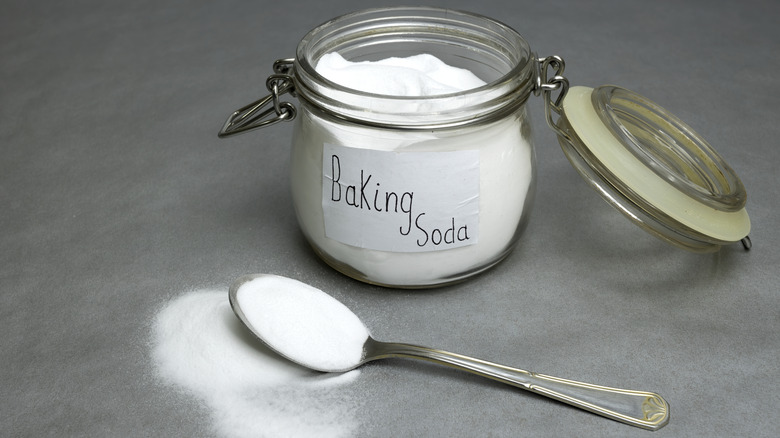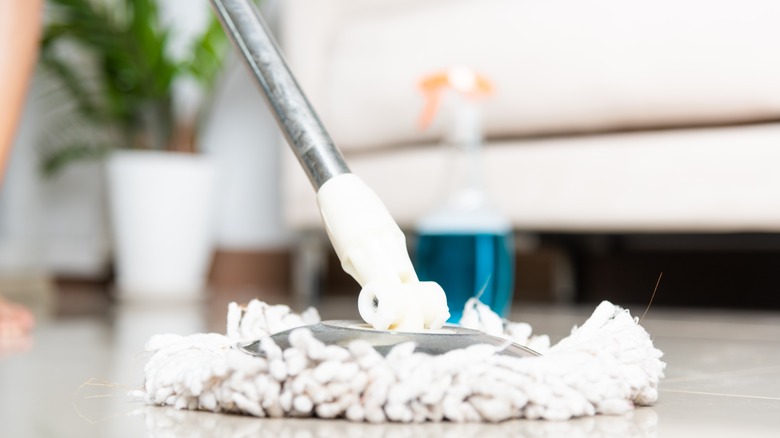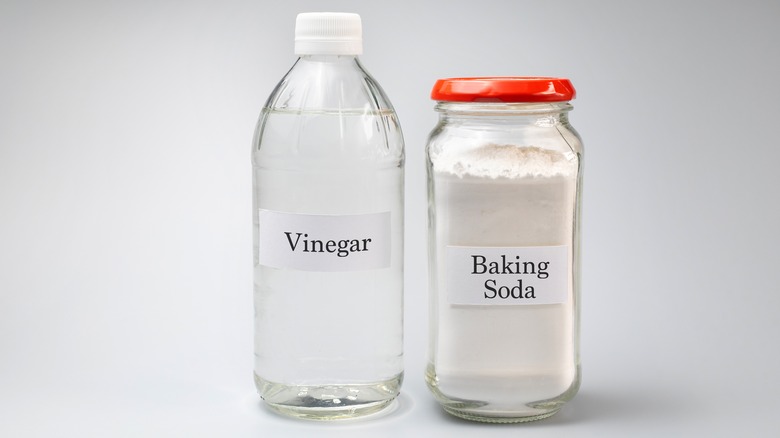Should You Be Using Baking Soda On Your Floor?
Baking soda is one of the most versatile household products, capable of cleaning almost anything from your teeth to your toilet. But, should it be used on your floor? Baking soda (also known as sodium bicarbonate) does receive high marks as an effective floor cleaner, but with certain restrictions. Designing Idea points out that, when used properly, baking soda is powerful enough to do the job but sufficiently mild to avoid damaging the floor. It can be safely applied to a variety of floor surfaces to thoroughly clean while sanitizing and deodorizing, per Express. Baking soda is a potent stain remover as well and it works efficiently to erase scuff marks, according to Arm & Hammer.
Sodium bicarbonate is eco-friendly while easy on the budget. Unlike many harsh chemical products, it is safe for use as a cleaner — so safe, it is sometimes ingested as a home remedy, per Medical News Today. To clean floors, baking soda is used unadulterated, or in a solution or paste. It is sometimes mixed with water, white vinegar, or hydrogen peroxide. Olive oil, lemon juice, or dish soap can also be used with it for cleaning purposes, even ammonia. Proper sweeping, mopping, and drying protocols should be followed for best results, and it is essential to note that baking soda is not suitable for certain surfaces. According to Granite Gold, using it on marble or other natural stone floors is problematic, and care needs to be taken when cleaning hardwood floors.
Floor cleaning do's and don'ts
Per Flooring, baking soda remedies are appropriate for linoleum, porcelain, vinyl, laminates, and ceramic floors, and they will not harm glazed tiles. However, baking soda is considered to be detrimental to polyurethane. In addition, it should not be used to clean floors treated with wax. According to World Sustainable, baking soda should only be used conservatively on wood floors, for fear of damaging the surface or leaving a powdery white residue to boot. To eliminate a baking soda coating, try rubbing it with a wet rag or sponge, treated with olive oil and a spritz of vinegar, then cleaning the white spot with warm, soapy water.
According to The King Live, rule #1 before applying baking soda or any other cleaner is to sweep or vacuum the floor, and don't overlook baseboards or the edges abutting walls and cabinets. Test your cleaning method of choice on a limited, less-visible area of the floor to ensure it is safe to use. Mix vinegar and baking soda thoroughly to prevent lumps, and don't keep the paste or solution on the floor for a prolonged period. When applying cleaning solutions, rotate the mop as you go so you are only using the clean side, and wash it in clean water when it becomes completely dirty. Mop and rinse thoroughly so the surface is not left slippery or tacky. Mopping section by section will make your job more efficient and thorough, Out of Sight Cleaning recommends.
Best floor cleaning methods
Many recipes call for mixing sodium bicarbonate with vinegar. Baking soda is alkaline (having a pH level higher than 7), and vinegar is acidic. When the two mix, a gas-releasing reaction occurs that will dissolve and lift stains, grime, and break down bacteria and dust mites. However, Pulling Curls is restrained in touting baking soda. It recommends restricting it to a paste for cleaning grout and pushes just vinegar itself for total floor cleaning. The paste can be left on grout for several hours, then scrubbed using a soft brush, and then mopped. Clean the grout first, then work on the entire floor.
Dmcoffee's cleaning mixture is a quarter cup of white vinegar, an equal amount of baking soda, 2 gallons of hot water, and a tablespoon of dish detergent. For more aggressive floor cleaning, mix a cup of baking soda in a gallon of warm water, adding 3/4 cup of vinegar, and a cup of ammonia. Real Homes suggests attacking stubborn stains with a baking soda paste or even directly sprinkling the sodium bicarbonate on them. Scrub with a toothbrush and up the ante by adding lemon juice. For maximum shine, Soji Cleaners recommends baking soda, with a solution of 1 gallon of hot water and a cup of vinegar, topped off with a couple of drops of dish soap. Avoid extremely hot water and don't use ammonia with this elixir. Hydrogen peroxide can be used with it when cleaning bathroom floor tiles.


